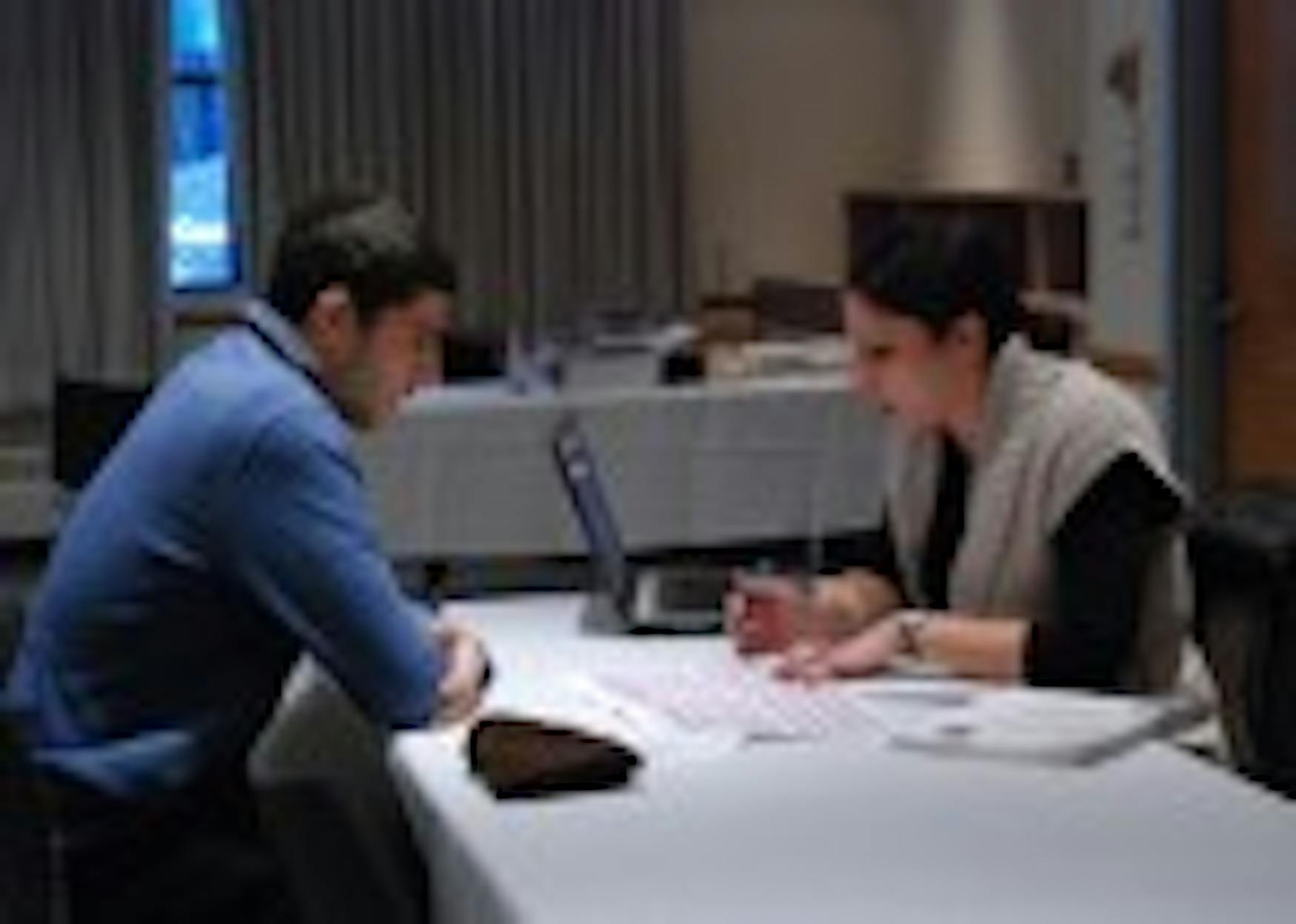Testing a future
Dr. Harry Ostrer provides students with free genetic testing
Last Tuesday the Lurias in Hassenfeld Conference Center had a different feel than usual. Instead of having empty chairs and tables, students were seated against the wall waiting in line or moving table to table to answer questions about their genetic histories. Next, students moved to to a table to have a blood sample taken. In four weeks, these students will know what genetic diseases they might carry. Dr. Harry Ostrer, the geneticist behind the testing, came to Brandeis with a team of assistants from New York University to conduct free genetic tests on students of Jewish heritage. Ostrer, who has a distinctively dark mustache, specializes in studying diseases that affect Ashkenazi Jewish populations.
Ostrer and his team have been traveling to various college campuses across the United States to offer free genetic screening since the 1970s and 80s. Since then, Ostrer has been to schools such as Stanford, Harvard and Yeshiva University.
Genetic testing involves taking a blood sample so that the DNA can be sequenced and analyzed to find out whether a person carries genetic defects or diseases. The students who were tested will get their results back in four to six weeks.
Ostrer says the importance of getting tested as early as possible comes down to having a broader display of options about potential diseases early on. In the past, people learned about their risk for having affected children only after a child was born.
"Through genetic testing, it is possible to identify people whose children may be at increased risk," says Ostrer.
Ostrer decided to focus his research primarily on Ashkenazi Jews after finding evidence pointing to the reappearance of many prevalent disorders in Jews of Eastern European descent. Diseases such as Canavan disease, cystic fibrosis and Tay-Sachs are some of the most severe. The signs and symptoms of Canavan disease are mental retardation, seizures and cerebral palsy. It progresses rapidly and is fatal by the age of 12, and approximately one in 40 Jews of Eastern European descent is a carrier. Cystic fibrosis causes frequent respiratory infections that later lead to lung damage. The disease also affects the digestive system and ultimately the heart. Approximately one in 20 Ashkenazi Jews are carriers. Tay-Sachs, one of the most feared diseases, causes blindness, mental retardation, seizures and paralysis. It is fatal by age four to five. Approximately one in 25 Eastern European Jews are carriers, while one in 300 are carriers in other groups.
Understanding how the body works is important in understanding Ostrer's work. We inherit two copies of most genes, one from the mother and one from the father. If one of these genes is mutated, the proteins created from that gene will be abnormal. While a mutation in one copy of a gene can sometimes lead to disease, often a person with one mutation will only be a "carrier" of the disease rather than express the disease themselves. A man and a woman who both carry the genetic defect, however, are at risk for having a child with two defective copies of the gene and thus the disease.
Ostrer's extensive research on Jewish genetics has created awareness among Jewish college students about what diseases they may be carriers of.
Ostrer tests students, most of whom are unmarried, to give them time to think about their options. Since most college students are not confronting reproductive choices, upon finding out that they are carriers of a gene for a recessive disease, they will be able to make more informed decisions.
Paul Gale '12, is a little nervous about the results but thinks that testing is important and was surprised that more students were not tested.
"It's a reality I'd have to face at sometime, and I'd thought I'd get it over with. It puts things into perspective," says Gale.
Ostrer says that couples in which both partners carry recessive genes for any given disease have two options in order to bear a child.
"For couples who have an affected fetus, there is termination of pregnancy. Another possibility for carrier couples is in vitro fertilization," says Ostrer. "When you're in college, it is not too soon to start thinking about it."
With that in mind, some college students were still skeptical about getting tested.
"There is no need to know now; when and if I decide to have children, I will definitely consider getting screened," says Nathan Mizrachi '12.
Students who did choose to get tested were primarily of Ashkenazi descent. However, there is a common misconception that most genetic diseases are prevalent only among Ashkenazi communities.
"There are some conditions that are common in both Ashkenazi and Sephardic communities," says Ostrer.
For example, cystic fibrosis is present among virtually all Jewish populations, says Ostrer.
Ostrer also says that the there is a very low possibility of there having been any sort of cultural interaction or exchange among Ashkenazi and Sephardic Jews, given that they lived on completely opposite sides of the world.
"Some people think that being a carrier of cystic fibrosis actually increases your resistance to being infected by plague, so there may actually have been natural selection occurring that gave selective survival advantage to people with cystic fibrosis," says Ostrer, although he says this is only a theory.
Apart from his work on college campuses, Ostrer is also looking to expand these genetic screening tests to involve other ethnic groups. Many ethnic groups have diseases that occur more frequently among their members than in general populations. For example, sickle cell anemia is very common among black populations, and thalassemia is prevalent mainly among individuals of Mediterraean ancestry.
Currently, Ostrer and his team are looking to "develop genetic tests that would be more specific for Iranian and Syrian Jews, which are the third- and second-largest Jewish populations in America.



Please note All comments are eligible for publication in The Justice.